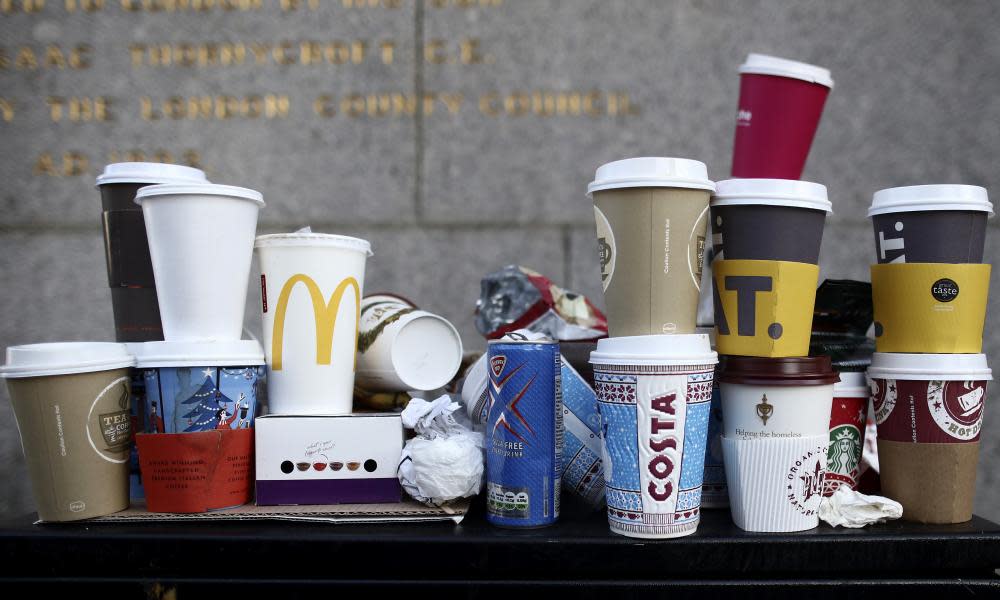UK public backs tough action on plastic waste in record numbers

An unprecedented number of people have backed tough action against plastic waste in a government consultation that could pave the way for a series of fiscal measures in the autumn budget.
The government will say response is evidence that there is broad public support for reducing single-use plastic waste through measure such as a “latte levy” on coffee cups, similar to the plastic bag charge, and tax incentives for recycling.
There were more than 162,000 respondents to the Treasury’s call for evidence, including individuals, businesses and campaign groups, with the vast majority expressing support for action, the department said.
The government has already banned microbeads from cosmetics and is exploring extending the 5p plastic bag charge, as well as the possibility of aisles in supermarkets stocking products with plastic-free packaging.
It is also examining a ban on plastic straws, stirrers and cotton buds, as well as the introduction of a deposit return scheme to increase recycling.
Why is plastic being demonised?
Since the 1950s, 8.3bn tonnes of plastic has been produced. Plastic is seen as a versatile, indispensable product, but the environmental impact is becoming more stark. Plastic is now so pervasive that recycling systems cannot keep up and the leakage into the environment is such that by 2050 plastic in the ocean will outweigh fish. Last year scientists found plastic fibres in tap water, and plastic has been found in the stomachs of sea creatures in the deepest part of the ocean. Most plastic waste ends up in landfill sites or leaks into the natural environment, where it is causing huge damage to eco-systems on land and sea, creating near permanent contamination. According to academics in the United States, by 2015, of all the plastic waste generated since the 1950s, only 9% has been recycled, with 12% incinerated and 79% accumulated in landfill sites or the environment.
Why are the supermarkets under fire?
Producers of plastic include retailers, drinks companies and supermarkets. The Guardian revealed that supermarkets create more than half of the plastic waste in the household stream in the UK. But they refuse to reveal how much they put on to the streets and how much they pay towards recycling it. Supermarkets are under pressure to reduce their plastic packaging and campaigners argue they have the power to turn off the tap. Much of the packaging they sell to consumers is not recyclable: plastic film, black plastic trays, sleeves on drinks bottles and some coloured plastic. The Recycling Association and other experts believe supermarkets could do much more to make packaging 100% recyclable and reduce the use of plastic.
Who pays to clean up the waste?
The taxpayer, overwhelmingly. Producers and retailers pay the lowest towards recycling and dealing with their waste in Europe. In other countries, the “polluter” is forced to pay much more. In France, a sliding system of charges means those who put more non- recyclable material on the market pay more.
What can shoppers do to help?
Supermarkets are under pressure, not least from the prime minister, to create plastic-free aisles. A growing number of zero-waste shops are springing up and consumers are being encouraged to ask for products to be sold without plastic.
Sandra Laville
The Treasury said it was now clear there was widespread support for further action including:
Measures to reduce demand for single-use plastics such as coffee cups and takeaway boxes.
Encouraging greater use of recycled plastic in manufacturing.
Discouraging the use of difficult to recycle plastics, such as carbon black plastic.
Speaking during a visit to a cleanup operation on Perranporth beach in Cornwall, the exchequer secretary to the Treasury, Robert Jenrick, said: “Tackling the scandal of plastic pollution is one of our top priorities and we know the public is right behind us. I’ve been overwhelmed by the public support and the responses we’ve received will be invaluable as we develop our plans for using the tax system to combat this.
“Our duty to leave the environment in a better state than we found it is absolutely clear and what we’ve set out today is another important step to ensuring a cleaner, greener future for Britain.”
One of the organisations taking part in the cleanup, Surfers Against Sewage, said the response to the consultation showed the demand for immediate action.
Its chief executive, Hugo Tagholm, said: “This is a clear indication of the public appetite for more fiscal interventions to help reduce plastic pollution littering our environment, from inner-city streets and countryside to our oceans.”
Louise Edge, a senior plastic pollution campaigner at Greenpeace, said: “This is practically a people’s plastic charter calling on the government to tax single-use plastic, incentivise recycled content, get rid of problem plastics and boost recycling rather than incineration.
“The so-called latte levy on disposable coffee cups seems inevitable now, but that should be just the tip of the iceberg.”

 Yahoo News
Yahoo News 
